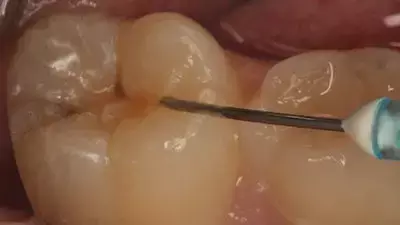- Home
- Medical news & Guidelines
- Anesthesiology
- Cardiology and CTVS
- Critical Care
- Dentistry
- Dermatology
- Diabetes and Endocrinology
- ENT
- Gastroenterology
- Medicine
- Nephrology
- Neurology
- Obstretics-Gynaecology
- Oncology
- Ophthalmology
- Orthopaedics
- Pediatrics-Neonatology
- Psychiatry
- Pulmonology
- Radiology
- Surgery
- Urology
- Laboratory Medicine
- Diet
- Nursing
- Paramedical
- Physiotherapy
- Health news
- Fact Check
- Bone Health Fact Check
- Brain Health Fact Check
- Cancer Related Fact Check
- Child Care Fact Check
- Dental and oral health fact check
- Diabetes and metabolic health fact check
- Diet and Nutrition Fact Check
- Eye and ENT Care Fact Check
- Fitness fact check
- Gut health fact check
- Heart health fact check
- Kidney health fact check
- Medical education fact check
- Men's health fact check
- Respiratory fact check
- Skin and hair care fact check
- Vaccine and Immunization fact check
- Women's health fact check
- AYUSH
- State News
- Andaman and Nicobar Islands
- Andhra Pradesh
- Arunachal Pradesh
- Assam
- Bihar
- Chandigarh
- Chattisgarh
- Dadra and Nagar Haveli
- Daman and Diu
- Delhi
- Goa
- Gujarat
- Haryana
- Himachal Pradesh
- Jammu & Kashmir
- Jharkhand
- Karnataka
- Kerala
- Ladakh
- Lakshadweep
- Madhya Pradesh
- Maharashtra
- Manipur
- Meghalaya
- Mizoram
- Nagaland
- Odisha
- Puducherry
- Punjab
- Rajasthan
- Sikkim
- Tamil Nadu
- Telangana
- Tripura
- Uttar Pradesh
- Uttrakhand
- West Bengal
- Medical Education
- Industry
Retention of hydrophilic resin-based sealants better than glass ionomer sealants

Retention of hydrophilic resin-based sealants better than glass ionomer sealants suggests a new study published in the Evidence-Based Dentistry
A study was done to compare the effectiveness of hydrophilic resin-based versus hydrophobic resin-based and glass-ionomer pit and fissure sealants.
The review was registered with Joanna Briggs Institute and followed PRISMA (Preferred Reporting Items for Systematic Reviews and Meta-Analyses) guidelines. PubMed, Google Scholar, Virtual Health Library, and Cochrane Central Register of Controlled Trials were searched from 2009–2019 using appropriate keywords. We included randomized controlled trials and randomized split-mouth trials conducted among 6–13-year-old children. The quality of included trials was assessed using modified Jadad criteria and risk of bias using guidelines specified by Cochrane. GRADE (Grading of Recommendations Assessment, Development, and Evaluation) guidelines were used to assess the overall quality of studies. We used the random-effects model for meta-analysis. Relative risk (RR) and confidence intervals (CI) were calculated & heterogeneity was tested using I² statistic.
Results
Six randomized clinical trials and five split-mouth trials met the inclusion criteria. The outlier augmenting the heterogeneity was omitted. Based on very-low to low-quality evidence, loss of hydrophilic resin-based sealants was less likely as compared to glass-ionomer fissure sealants (4 trials at 6 months; RR = 0.59; CI = 0.40–0.86), while it was similar or slightly lower than hydrophobic resin-based sealants (6 trials at 6 months; RR = 0.96; CI = 0.89–1.03); (6 trials at 12 months; RR = 0.79; CI = 0.70–0.89); (2 trials at 18 months; RR = 0.77; CI = 0.48–0.25).
This study revealed that retention of hydrophilic resin-based sealants is better than glass ionomer sealants but similar to hydrophobic resin-based sealants. However, higher-quality evidence is necessary to underpin the outcomes.
Reference:
Kapoor, V., Kumar, A., Manjunath, B.C. et al. Comparative evaluation of retention and cariostatic effect of glass ionomer, hydrophobic & hydrophilic resin-based sealants: a systematic review and meta-analysis. Evid Based Dent 24, 41–42 (2023). https://doi.org/10.1038/s41432-023-00850-2
Dr. Shravani Dali has completed her BDS from Pravara institute of medical sciences, loni. Following which she extensively worked in the healthcare sector for 2+ years. She has been actively involved in writing blogs in field of health and wellness. Currently she is pursuing her Masters of public health-health administration from Tata institute of social sciences. She can be contacted at editorial@medicaldialogues.in.
Dr Kamal Kant Kohli-MBBS, DTCD- a chest specialist with more than 30 years of practice and a flair for writing clinical articles, Dr Kamal Kant Kohli joined Medical Dialogues as a Chief Editor of Medical News. Besides writing articles, as an editor, he proofreads and verifies all the medical content published on Medical Dialogues including those coming from journals, studies,medical conferences,guidelines etc. Email: drkohli@medicaldialogues.in. Contact no. 011-43720751


